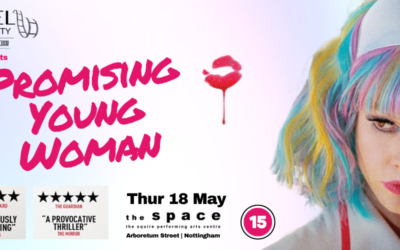Reel Review: Gloria
By Sarah, Reel Equality Film Club Volunteer, 17th March 2021, 2pm.
Equation’s Reel Equality Film Club carefully chooses films for screenings, using a detailed checklist of considerations (equation.org.uk/reelequality). Few films tick all the boxes. The Bechdel Test* helps us decide if the film tells a woman’s story. Other considerations include avoiding films in which women are portrayed only as victims of violence, only in stereotypical female roles (such as carers, or home-makers), or seem there only for looks or sex appeal. We seek to portray a diversity of women’s stories of different experiences and backgrounds. Here’s a window onto some of our thoughts…
From the perspective of gender equality, what is good about Gloria?
Gloria represents the role of the mother in a way that Hollywood cinema rarely does. Gloria is a middle-aged, divorced Chilean woman who is trying to reconnect with her identity after her divorce and now her children are adults. The film follows her romance with a man called Rodolfo. In some respects, the film introduces a role-reversal of the stereotypical relationship, in which the leading lady is more expressive about her emotions than her male partner. It is Rodolfo who is emotionally intense towards Gloria: he often gestures love and admiration for her. He is very expressive about his own flaws, while Gloria remains silent about many of her feelings. This challenges typical romance narratives. Gloria’s physical form also does not correlate with that of a mainstream, romantic lead: a young, slim and smooth figure. The film is honest about the middle-aged female body, using a static camera while Gloria and Rodolfo are naked or are having sex. Her figure has curves, lumps and bumps, and she enjoys her own body as it is. Gloria gracefully and honestly represents one woman’s journey of learning of to enjoy her own company in a later stage of her life where she is no longer a mother or wife.
What is problematic about the representation of gender in this film?
Although Gloria seems emotionally stable, she often makes rash decisions. The film is tinged with a sense that Gloria has lost her mind because Rodolfo has upset her. This implies that she is dependent on the company of a man in order to enjoy herself. A need to be dependant also presents itself when she begins to smoke marijuana while depressed. These actions recreate a narrative where audiences are asked to pity women rather than consider them capable of dealing with problems. Additionally, interaction with other women is sparse, and other characters do not challenge stereotypical role representations. Rodolfo’s daughters are rarely seen and only discussed as antagonistic, selfish and dependent on their father. Meanwhile, Gloria’s daughter appears hedonistic and careless. In the long run, Gloria is the only person given a balanced perspective of life as a woman. This seems to isolate her from all other women in her life.
*To pass the Bechdel Test, a film must meet the following 3 criteria: Are there at least 2 women in this film? Do they ever talk to each other? About something other than a man? We are saddened by how few films pass this base-line test…
LET US KNOW WHAT YOU THINK – SHARE YOUR REVIEW AT FACEBOOK.COM/REELEQUALITYNOTTS
Other Events
Promising Young Woman
Promising Young WomanThur 18th May 2023The Space - the Squire Performing Arts Centre | Arboretum Street, NottinghamMore than a screening - Stalls | Food | SpeakersStudents: free | General public: Pay what you can This May, Reel Equality Film Club will be returning to...
Other Ways to Get Involved
Reel Equality
Equation’s award-winning Reel Equality Film Club shows great movies that tell women-centred stories and challenge gender stereotypes. Join our campaign for better representation of women on screen.
Campaign With Us
We campaign in Nottingham and Nottinghamshire to raise awareness of domestic abuse, gender inequality and signpost survivors to safety and support.
Social Media Ambassadors
Campaigning online is a great way to take action and can be done from anywhere.
How you can help
No matter how much time, money or resources you can afford to give, your support will make a difference.
£10
Give monthly
Could pay for four children
to take part in our early intervention projects
£30
Give once
Could pay for one primary school child to receive our healthy relationship education program
Support equation
Check out the other ways you can support us


